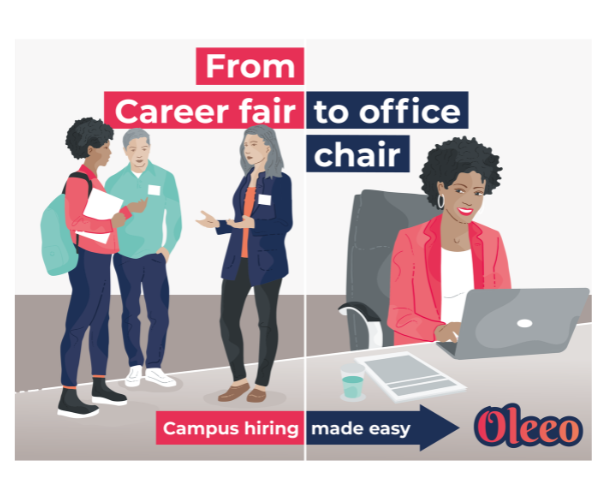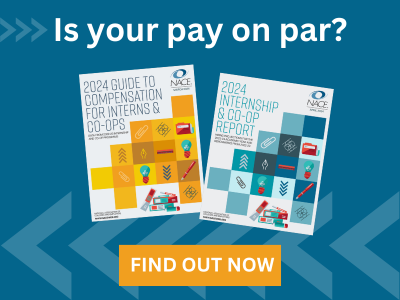Employers and students say the college degree is worth it.
NACE Journal / Fall 2023
Is college worth it?
That question has been swirling in the public discourse for many years, triggered in large part by the cost of attending college—a very real concern—but also pushed by the undocumented notion that many, if not most, jobs can be done without a college degree.
While research has been conducted about the financial return of a college education, we wanted to understand the employer and student perspectives on this question.
Here is what we found: Employers do value the college degree. New college graduates do think their college education is worth it.
What Employers Say About the College Degree
Employers responding to NACE’s 2023 Recruiting Benchmarks Survey said an average of nearly 70% of their entry-level jobs require a bachelor’s degree. So, that punctures the notion that a degree is not needed for most jobs.
We also looked at this from a slightly different angle and asked employers about entry-level positions filled by bachelor’s degree graduates, and how that might have changed over the last three years. Nearly 80% said there had been no change over the past three years, just 12% said there was a decrease in entry-level hires with bachelor’s degree graduates, and nearly as many (11%) said there was an increase in those entry-level hires with bachelor’s degrees. This reinforces the idea that the bachelor’s degree is valued for the entry-level position.
Not content to address the issue merely through inference, we asked employers explicitly about whether there had been discussions in their organization about eliminating the college degree for certain entry-level jobs. Here’s what we found:
- Only about one-quarter (26%) said there had been discussions.
- Those discussions were driven by a focus on skills and concerns about equity, followed by a shortage of talent.
- None—0%—cited lack of confidence in the college degree as a reason behind their discussions.
It is important to note that employers responding to our survey tend to represent large organizations and those that traditionally recruit new graduates for professional entry-level jobs. There may be degree inflation affecting some other types of entry-level jobs that are offered by other types of employers.
What Employers Say About Higher Ed Institutions
We also asked employers—for the first time—about the value they place on certificates for new college graduates and about the quality of certificate providers.
Only about one-fifth of employers told us they were actively seeking new entry-level hires with certificates, but their view on certificate providers was interesting—and illuminates their view of higher ed.

More than three-quarters of employers told us that they see college/university-based certificates as being of the highest quality—far outpacing other types of providers. This underscores that, for employers, there is a direct line between the value of a certificate and the curriculum and rigor academia brings to bear.
Students: 91% Would Pursue a College Degree Again
Students are nearly unanimous in their view of higher ed: 91% of graduating seniors told us that they would pursue a college degree again if they had to the chance for a do-over. Let’s crow about that!
A high percentage also said that their degree will help them find meaningful work and a job that aligns with their career goals. That’s also positive news.
When we look at students’ perceptions about the financial returns of college, we see that they recognize the cost but prioritize a different type of ROI.

For context, it is important to know that, despite the cost of a college education and the debt they have from loans that now carry interest rates ranging from 5.5% to 8.05% for federal loans and significantly higher rates for private loans, more than half said they expect a positive financial return on their college investment. At the same time, however, only about a third expect to pay their loans off in a reasonable amount of time. In addition, more than half expect their degree to provide for economic security. So, students do understand the potential financial rewards associated with their degree.
Considering that there are still a large number of students who are not as confident about the financial ROI and economic security of their degree, it is noteworthy that nearly all graduating seniors say they would do college all over again, given the chance. This suggests that students view college as a means to a career and life enriched by intellectual pursuit and career satisfaction, rather than only by financial gain.
Clearly, the value of a college education can’t only be measured in dollars and cents.
Recommendations for Addressing the Value of Higher Ed
What are we to do with this information? Here are steps you can take to move this important conversation forward.
1. Share the news: Let’s use our individual and collective voices to counter inaccurate depictions of higher education and the college degree. Share our statistics with your leadership, stakeholders, and others who would benefit from gaining evidence-based insight into the value our institutions bring to students, to the workforce, and to the nation.
2. Help students gain confidence in their preparation for the world of work: It’s good news that more than half of graduating seniors say their institution prepared them well or very well for the next step. However, that leaves
nearly half who aren’t so confident about their preparation.
For career services professionals, one big step toward this is implementing career readiness campus-wide. Faculty are critical to how students perceive their preparation for the world of work, and engaging faculty is the best means for helping students not only gain important competencies that they need to succeed in their careers but also recognize how their coursework is one of the most significant drivers of competency development.
More by Shawn VanDerziel
The Value of Career ServicesWork Modality: The Changing Nature of Where We Work
A second way to impact students’ perceptions about their preparation is to arm them with the knowledge of what it takes to be competitive in the job market.
First, our research shows that students who used any of the services offered by their career center had better outcomes than those who didn’t. Second, we know from employers that the student who has completed an internship is likely to get the job over one who hasn’t, even assuming both are otherwise equally qualified.
We also know it isn’t enough for students to have the skills and attributes employers are seeking—they need to communicate what they have to offer. We know from our research that students who engage in interview preparation have better outcomes than those who don’t, and it’s likely that’s because they are able to articulate their qualifications in a way that resonates with potential employers.
I know I’m preaching to the choir here: Career services professionals spend significant time trying to help students understand what they need to do and what the career center has to offer. Making career readiness a campus-wide initiative will provide a new route to students, especially when faculty are on board with sharing such information or willing to invite career services into the classroom to talk about gaining a competitive edge.
3. Share your data and best practices with NACE: There is a lot of work to be done to dig into the value of a college degree for both students and employers. We also need to examine in new and different ways what makes for positive outcomes and attitudes among new college graduates and how that aligns with their college experience and first destination.
Through our surveys and quick polls, we’re working to bring new and nuanced data to the forefront and provide our members with facts they need to be effective in their organizations and institutions. I encourage you to share your data with us: It benefits our professional community and provides important data that is needed at the national level with policymakers and other stakeholders. As such, your participation is vital to the overall mission and strategic direction of our professional community.
There is also great value in members sharing their successful practices with members. Two examples that arose from within our membership include faculty serving as career champions (a recent discussion thread in the NACE Community) and efforts to make career readiness a campus-wide initiative. There are many more. Kudos to those willing to share their successes with their fellow members. Practically speaking, it means we can build on each others’ successes as we play our part in advancing the value of higher ed.






